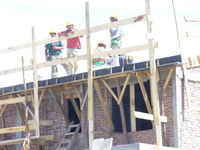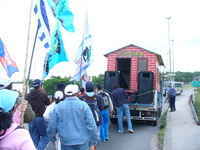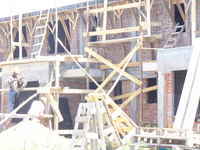Uruguay's "Urban Landless" Fight for Housing Cooperative
Following almost four decades of struggle for urban land to build their houses, mutual-aid housing cooperatives confront the progressive government of President Tabaré Vázquez, which has criminalized occupations and bogged down loans.
"We are facing people who know how to rule and know how to strike at unions," says secretary general of the Federation of Mutual-Aid Housing Cooperatives (Federación de Cooperativas de Vivienda por Ayuda Mutua—FUCVAM), Daniel de Souza. The organization was born in 1970, during a time of growing social movements in Uruguay. After over three decades of struggle, what is happening to them now under the leftwing government seems disconcerting.
"This is not a spontaneous issue. These leaders are not new; the people in the Housing Ministry have been ruling Montevideo for almost 20 years." The FUCVAM leaders consider that in the next months they have to make an effort to reverse the new laws and regulations, which they consider to be a "legal regression." Otherwise, the gains of the grassroots movement could be lost. In June the courts put five cooperative activists in prison for occupying a lot in the beach destination Punta del Este . This might be a preview of a new attitude on the part of the government.
History: 500 cooperatives, 22,000 families
The nearly 500 housing cooperatives under FUCVAM are the result of three great waves of land-struggle that led to the construction of over 20,000 homes. From 1970 to 1972, more than 40% of state housing resources went into financing the cooperatives.
The Federation was created on May 24, 1970 at the inauguration of the first cooperative, on the small Isla Mala inland community. During this period, a great number of cooperatives were created by the unions. Housing projects went up—in some cases over 800 dwellings at a time. Some 150 cooperatives were born and FUCVAM extended to practically the entire country.
The movement's second leap forward was in 1989. It was an election year and pressure for housing had been put off by the dictatorship (1973 to 1985), to the extent that in the early part of the decade there was a mushrooming of illegal urban settlements where homeless and rural immigrants lived. That July, after a massive assembly, four cooperatives occupied three lots. In November Tabaré Vázquez won the elections in Montevideo and created a "land portfolio" fund, and negotiations with the cooperative movement began.
Over the following years, some 250 cooperatives gained access to land, and many began building houses. It was a decade characterized by frequent mobilizations, most noteworthy the occupation of the Ministry of Housing and the Ministry of the Economy. These movements involved construction by some 2,000 families in 30 cooperatives.
The 1989 occupations are seen as a watershed by movement members. "Land occupations had, until that moment, been a pretty spontaneous phenomenon," that took place with a low profile, little visibility, avoiding the notoriety of an "illegal" act.1 FUCVAM opted for the opposite way: occupation was necessary to become visible. Somehow the "worker" culture, foundation of the cooperative movement, began to fuse with measures that new movements began to implement in Latin America. During this period a new collective self-concept evolved, and they began to see themselves as "urban landless."
The third drive came last year, under the incumbent government. Housing pressure, after a decade of structural adjustments and the crisis of 2002, was reflected in the creation of a hundred cooperative groups struggling for getting land. To break the impasse they decided, in October 2006, to occupy a piece of land owned by the state railway company that had been abandoned for 40 years. In negotiations they obtained 20 lots where 40 cooperatives settled.
"We still have 30 cooperatives without land," says the Federation. In almost 40 years the movement has built houses for over 22,000 families whereas some 40,000 hope to access land to begin the legalization process.
Jail for Occupiers
In April, the Parliament approved a law that sets three-month to three-year jail terms for squatters. The surprise is that the Frente Amplio supported the new law, although Housing Minister Mariano Arana said he was against what the majority-party deputies had decided.
FUCVAM is ready to challenge the law. On July 28, together with rural workers (sugar-cane cutters from the North) who have occupied a 32-hectare piece of land, they held a rally in Montevideo and marched on the governmental palace. They reject a law that, in their view, "criminalizes" land-occupations. De Souza, the secretary general, said that in September occupations would begin in an "organized fashion," and would be "non-anarchic." Other leaders maintained that the government is trying to "criminalize protest, the mobilizing capacity of the popular sectors which are, in the end, the only guarantee for transforming this unjust structure of wealth we have."
But the fundamental problem does not seem to be a legal one, but rather the economic model itself. FUCVAM maintains that the 14,000 homes the government has promised will only be built at a rate of 3,000 per year over the next five years. If the model does not change, "emigration from the countryside to the city will continue, and when newcomers arrive, and they are unemployed, that's two reasons to be pushed out to the periphery," say the cooperative members.
Problems with the Progressive Government
The Housing Ministry drew up Cooperative Regulations that were harshly criticized by the Federation. The ministry's objective is to organize and improve the system to open access to credit, and this way, be able to better plan the adequate use of resources. The new regulations say that housing cooperatives could request State funding only during the Cooperative Project Applications that take place once a year.
According to architect Benjamin Nahoum, a FUCVAM adviser, the new regulations "could represent a serious obstacle for the development of the cooperative system."2 "The final result is perverse," because a cooperative invests at least two to three years in the entire process. Therefore, "it can't be subject to winning or losing a contest" whose rules are not made clear at the outset. "It would seem they don't understand that once the group is formed, it gets the land, and the institute begins works on a project, the people have to be sure that at some time the program will materialize," concluded Nahoum. "Because in this case no one is going to feel motivated to take this route. Is this what they want? We hope not."
Relations between cooperatives and the Housing Ministry are not good, and they seem destined to get worse. On the one hand, the right is pressuring the parliament. FUCVAM criticism points to the government's global policy. They feel that housing is not among the government's priorities. "What a coincidence, there had never been a problem with the land portfolio and during the two years of a leftist government we have had to stage occupations in order to get land," Souza points out. Since 1989 there had been no occupations. They feel that under the new legislation they will be unable to occupy lands, and access to loans for construction will be increasingly slower.
September 15-16 FUCVAM will hold a national assembly to define its next steps. Among them, leaders expect will be the adoption of a mobilization plan to pressure for change from the grassroots.
This is similar to what is happening in other countries where there are progressive governments, such as the Movimiento Sin Tierra Landless Movement in Brazil and the Lula government. Criticism of the Tabaré Vázquez government is now expressed loud and clear. "They make like they are discussing, but they do not listen, they do not compromise," Souza concludes.
A Different Urban Movement
The movement for housing construction through cooperatives and mutual-aid is a modality where a group of families (from 10 to 200) form associated groups that work democratically. They fight to obtain land, occupy or purchase it with state or NGO financing, and then put up their homes using family labor.
They go through four stages: obtain legal recognition, select an institution for technical assessment, get the land, and obtain the loan to build on it. Men and women work on equal terms to build the homes, putting in the same number of work-hours. Together they promote the process of design and construction making decisions in assemblies, and then they manage the housing complex. The landlord is the cooperative, the families have rights to usage but cannot sell without authorization from the collective.
Cooperative members build all the homes without knowing who will occupy each one. The day of the inauguration, there is a drawing, and each family occupies the one they draw. Women participate at each step of the process, including construction, and this marks a difference from other social movements. FUCVAM also has a training school and an industrial plant that provides cooperatives with material. Egalitarian participation in work, assembly attendance, and economic support are mandatory for all associates.
Cooperative neighborhoods are mostly at the edge of cities. Many cooperative groups have child-care, health clinics, and shopping centers self-run by the neighbors themselves. The movement also has 22 libraries and 17 gyms in Montevideo neighborhoods. Cooperative regulations are extensively discussed in assembly.
End Notes
- Gustavo González and Javier Vidal, p. 51.
- El Solidario No. 85, August 2007.



